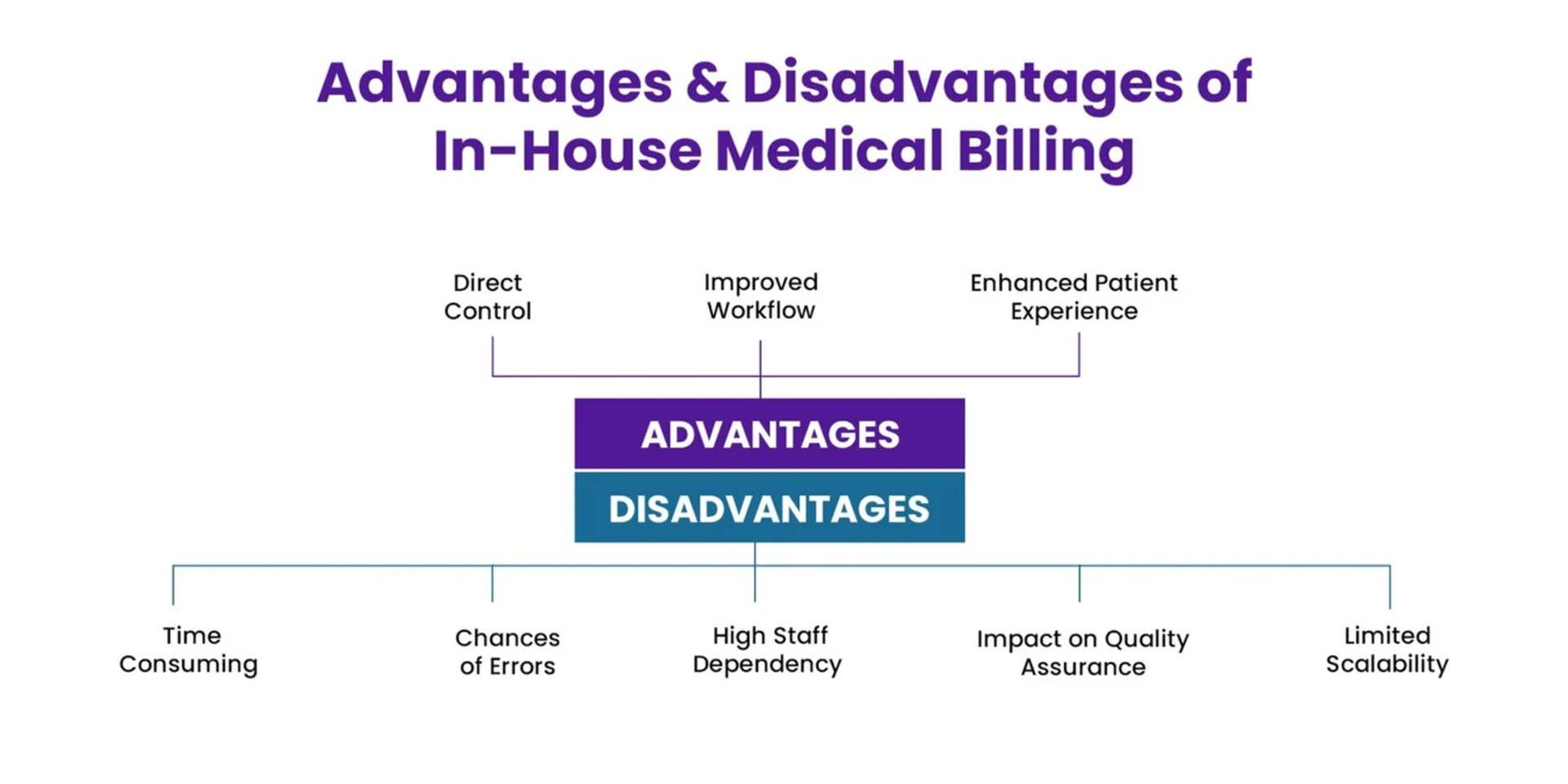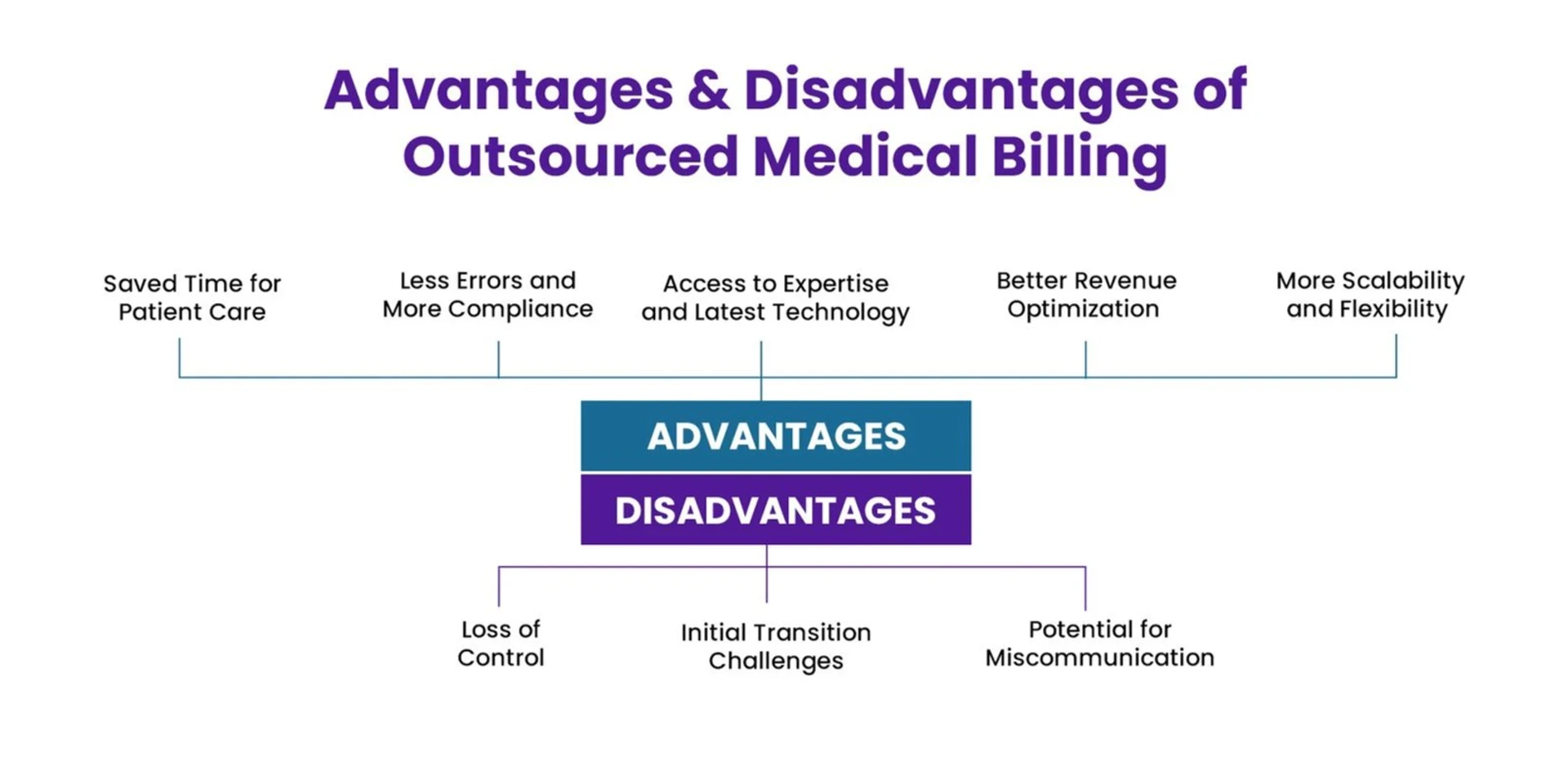Given that medical billing is perhaps the most important function that determines the cash flow of your healthcare organization, you should always invest enough time and thought in making decisions while choosing between outsourcing vs in-house medical billing.
Needless to say, both methods have worked well for many healthcare businesses. Still, your choice should depend on the costs incurred in running the practice and most importantly, your business requirements.
Confused? Well, do not be. This blog explains both the advantages and disadvantages of these methods and by the end, you will be able to choose the right one for you.
Advantages of In-House Medical Billing

Here are some of the biggest advantages of in-house medical billing:
Direct Control
In-house billing directly gives healthcare providers hands-on control over their financial activities. This certainly means they can have direct access to any and every billing information, which enables quick decision-making and problem-solving.
They can oversee the entire process of billing and ensure every step complies with the particular requirements and protocols of their business. This is indeed very crucial for practices with unique billing patterns or specialized fields where a deep understanding of procedures and codes is required.
Improved Workflow
When billing is done in-house, billing managers get to collaborate with clinical staff, which ensures smooth communication and workflow. This, in turn, leads to quick resolution of coding queries, prompt addressing of documentation issues, and a better understanding of all the operations. In-house billing typically reduces delays and errors due to miscommunication, thereby making the entire process faster.
Enhanced Patient Experience
In-house medical billing enables practices to deliver a more personalized financial experience to patients. Since billing teams work directly within the healthcare organization and clearly know their billing policies, they will always be able to provide patients with timely assistance with bills and insurance claims. With faster resolution of billing issues and complete knowledge of the patient’s history with practice, in-house billing teams can ensure satisfactory patient experience.
Disadvantages of In-House Medical Billing
Now, let’s have a look at some disadvantages of in-house medical billing:
Time-Consuming
Managing a complete in-house billing department is extremely time-consuming for healthcare organizations. From hiring and training to keeping themselves abreast of changing billing rules and payer policies, almost every process requires a considerable amount of time. As a result, they often do not find enough time for crucial processes of practice management including strategic planning or expanding patient services.
Chances of Errors
In-house billing teams, particularly in smaller practices, do not always have the required expertise and resources that are mostly available to outsourcing RCM partners. This means their coding, claim submission, and follow-up processes are more prone to errors.
Even the smallest medical error can lead to denied claims, late payments, or even the violation of compliance. Additionally, the ever-changing healthcare regulations and frequent changes in billing codes also make it difficult for billing teams to ensure accurate medical billing.
High Staff Dependency
Dependency on key personnel is the biggest challenge with an in-house billing team. Losing skilled billing staff leads to serious disruption of a practice’s revenue cycle, which can result in delayed claims and loss of revenue.
Also, it is labor-intensive to train new staff which often temporarily drops the billing efficiency. This often happens with small-sized practices wherein billing responsibilities are assigned to only one or two staff.
Impact on Quality Assurance
Running an in-house billing department includes numerous overhead costs such as salaries and benefits, continuous training, workspace, billing software and more. As a result, the healthcare organization might be left with limited money to spend on initiatives that directly impact patient care.
Limited Scalability
Another disadvantage of in-house billing operations is that they do not scale well with practice growth. When patient volumes are increasing or the practice begins to expand its services, the billing operation is often incapable of keeping pace, resulting in backlog and even revenue loss.
So, scaling an in-house team requires a massive investment in recruitment, training, and infrastructure that can severely limit the practice’s ability to take steps towards growth or seasonal fluctuations.
Advantages of Outsourced Medical Billing

You may consider outsourced medical billing over in-house medical billing for the following reasons:
Saved Time for Patient Care
Relying on an RCM company saves healthcare providers and their staff from the tedious billing operations, thereby allowing them to pay more attention to patient care. This can result in stronger doctor-patient relationships as well as better outcomes.
Simply put, practice managers would be in a better position to allocate time to strategic initiatives that enhance the overall patient experience and the growth of practice.
Fewer Errors and More Compliance
Outsourcing medical billing means bringing expertise and advanced systems, cutting down billing errors and staying compliant along the way.
These companies have certified coders and billers who are abreast of all the regulatory updates and payer policies. They also utilize modern technology with unique features that ensure higher clean claim rates and faster payments.
Access to Expertise and Latest Technology
With an RCM partner comes access to the most data analytics tools and artificial intelligence systems that can identify trends, predict claim denials, and optimize revenue capture. Achieving this level of technological benefit is not easy in an in-house billing setup.
Additionally, RCM companies provide insights into performance benchmarks, payer behavior patterns, and revenue optimization strategies that a healthcare organization may not otherwise have access to.
Better Revenue Optimization
Another advantage of outsourcing billing to RCM partners is that they implement advanced strategies and methods to maximize reimbursements. Most of them aggressively follow up on denials, identify underpayments, and optimize charge capture to minimize revenue leakage.
Most RCM partners use data analytics to detect trends involving denials and reimbursements to enable adjustments in billing practices before the issues arise.
More Scalability and Flexibility
RCM companies also provide unmatchable scalability, which empowers healthcare practices to respond quickly to fluctuating patient volume demands.
Unlike in-house teams who find it difficult, time-consuming and resource-intensive to scale up, RCM companies effortlessly adjust their support levels according to the needs of the practice. This gives healthcare providers the flexibility to seize new opportunities and stay ahead of the curve.
Disadvantages of Outsourced Medical Billing
The following are some disadvantages of outsourced medical billing:
Loss of Control
Outsourcing medical billing certainly means healthcare providers losing control of their billing process. However, reputable RCM partners utilize the right reporting tools and channels to ensure that the practice has direct real-time access to information regarding its financial performance.
Initial Transition Challenges
Shifting from in-house billing to an outsourced medical billing service is a complicated process. It includes changes in workflow, communication protocols, and data transfer. But most of these challenges are usually temporary, which can be easily mitigated with careful planning and implementation. Moreover, the long-term positive impacts of higher efficiency and greater financial performance often outweigh the short-term transition challenges.
Potential for Miscommunication
Outsourcing billing adds one more layer to the communication chain between the clinical staff and billing specialists that may bring along miscommunication and delay in the information passed. However, these potential issues can easily be met if the in-house team and the RCM partner can communicate clearly and regularly.
Bottom Line
We hope this blog helped clarify and provide a clear understanding of outsourced vs in-house medical billing. While both approaches have merits of their own, the changing healthcare landscape increasingly favors the specialized expertise, advanced technology and scalable solutions offered by outsourced medical billing.
With an RCM expert, the healthcare provider can not just improve financial performance but also offer high-quality services for the patients without any administrative burden.
In an era where flexibility and efficiency are operative values, outsourcing billing is one of the key strategies that enable healthcare organizations to achieve sustainable RCM success.






